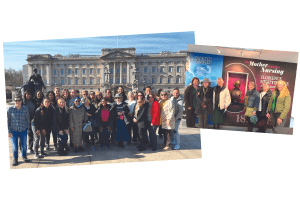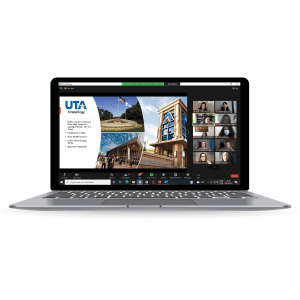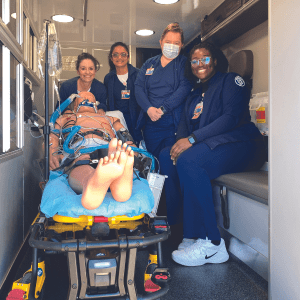IN ARLINGTON
and
BEYOND

The College of Nursing and Health Innovation is preparing students for success outside the classroom through rural and global immersion programs.
At the University of Texas at Arlington, students are prepared for successful careers through programs, classes, and immersive experiences. And the College of Nursing and Health Innovation (CONHI), students are going even deeper. Not only are they learning how to work in the health care field, but they are also being shaped into future leaders. They are focusing on research, clinical partnerships, and going far beyond Arlington, everywhere from small towns throughout Texas to global virtual exchanges. Study abroad programs, international partnerships, and rural area outreach help introduce CONHI students to a diverse range of health care needs, culture, and community.
LOCAL TO RURAL
CONHI students get to experience life outside Arlington during their graduate and postgraduate work through various local and rural experiences. Due to the pandemic, some of those experiences became virtual and brought students from different continents together to share their learnings and work together.
Finding opportunities for students to learn at the bedside is not as easy as it sounds. Nursing programs are competing for clinical positions at hospitals all over the country. DFW Region Partnerships and Dedicated Educational Units (DEU) were created to give students more opportunities to work within hospitals in rural areas and to expose them to potential future job placements.
DEUs, which CONHI now has at Medical City Fort Worth and Medical City Plano, utilize practicing nurses as preceptors. The DEU model allows nursing students to work directly with an assigned lead nurse mentor for hands-on experience while being able to obtain feedback and ask questions in real-time during each patient encounter.
Another program CONHI offers is Rural Nursing Immersion. Through this program, students gain experience at Childress Regional Medical Center (CRMC) in Childress, Texas. As students and nurses worked side by side, they shared knowledge and discussed innovative solutions to rural health care challenges, such as the benefits of telehealth for patients in rural areas.
“One of the many benefits for students is that they can learn about challenges rural nurses experience and how these nurses support their community,” says Jessica Smith, assistant professor.
Meagan R. Rogers, associate chair for undergraduate nursing, notes that in addition to connecting nurses with the community, it helps introduce them to new options for their careers.
“Rural areas can give students an opportunity to work with patients who have unique medical needs, witness small town hospital culture, and see beyond city life for future employment,” she says.
Jeana Bollinger (’22 BSN) said of her Childress experience, “I felt such a connection with CRMC after our visit, and I would have never had this experience otherwise. I was honored to have the opportunity to get this in-depth look at a rural health care environment.”
For Dr. Rogers, her work goes beyond licensure—it’s about helping students to find the right fit for their future employment. As nursing students enter the nursing field, she hopes to show what rural opportunities there are through engaging experiences not only in Childress, but also in Plano, Fort Worth, and beyond.
COMMUNITY-BASED RESEARCH
The College’s community partnerships extend from hands-on nursing experience to research, a critical part of CONHI’s comprehensive programs. The work of researchers in the College can impact communities across the nation, and students have the opportunity to help.
Jaquetta “Jada” Reeves, graduate nursing assistant professor, is currently developing creative and innovative strategies to improve sexual health services, increase access to high-quality care, and decrease the spread of STIs and risk of HIV among at-risk populations in underserved communities. Students participating in this research take part in helping to remove the stigma associated with getting tested for HIV—which affects 1.2 million people in the U.S, according to HIV.o—and other sexually transmitted diseases.
“We want to remove the stigma around STI testing and equip people to do self-testing in the privacy of their home,” says Dr. Reeves, who has partnered with CAN Community Health Clinic and the University of North Texas Health Science Center.
In another project, researchers are working to address and reduce preventable harms associated with the use or misuse of medications. Leading the research is Professor Yan Xiao, who says that 750,000 patients visit emergency departments per year due to harms associated with medications. Focused on older adults, Dr. Xiao is working with patient advocates and primary care organizations to look at how patients manage medications at home or in nursing facilities. Research partners include John Peter Smith Health Network in Tarrant County, which primarily serves underserved and low socioeconomic groups, and NorTex, a practice-based research network with over 200 primary care providers in North Texas. Xiao’s research program is primarily funded by the Agency for Healthcare Research and Quality.
“We want to understand what makes someone at higher risk to suffer medication-related harms and create interventions so that harms can be prevented,” he says.
INTERNATIONAL EXPOSURE
Students in many of CONHI’s programs are also given the opportunity to learn from and with international students. Students have traveled to Canada, virtually, through the International Nursing Student Collaborative to Assess and Improve Access to Rural Healthcare Services Program. Supported by a grant Dr. Smith received from the Matson Halverson Christiansen Hamilton (MHCH) Foundation in collaboration with the Global Rural Nursing Exchange Network, the partnership allowed students to learn about rural health care services, systems, and policies.
 Smith facilitated virtual meetings with CONHI undergraduate nursing students and a Canadian nursing student cohort regarding the unique challenges and opportunities present in both countries for rural health care access. Students saw the real-life challenges hospitals in other countries face, from staffing shortages to unique medical needs that require telehealth services from local city hospitals.
Smith facilitated virtual meetings with CONHI undergraduate nursing students and a Canadian nursing student cohort regarding the unique challenges and opportunities present in both countries for rural health care access. Students saw the real-life challenges hospitals in other countries face, from staffing shortages to unique medical needs that require telehealth services from local city hospitals.
Similar to the program in Childress, the Canadian partnership helps students learn about health care access in rural areas and how to equip patients when they leave urban hospitals and return to their surrounding communities. Smith’s personal experience with a hospital closing while she was a registered nurse helps fuel her passion to expose students to people who have to travel far for acute care. Like Rogers, she is also looking to inspire students to consider rural opportunities.
“It will be helpful for rural communities to expand this program for our nursing students as an effort to alleviate the rural nursing workforce shortage,” Smith says.
CONHI also has learning opportunities in London with a new Doctorate of Nursing Practice study abroad program, where students explore the history of nursing in the region and London’s relationship with its neighboring countries. By witnessing how other countries handle health care, students think critically and strategically about how they can make an impact.
“The London study abroad opportunity brought much of what I’ve been learning in the DNP program into real-world experience. It reinforced how important health care system concepts, such as social determinants of health, are impactful to the entire system and patient care outcomes,” says Sueanne Baddour, a nurse practitioner in the program working with adults and elderly patients in the primary care, hospice, and community palliative care settings.
Faculty are also gaining and sharing knowledge internationally. In Colombia, Erin Carlson, associate clinical professor and director of graduate public health programs, is using her Fulbright award to participate in a knowledge exchange with Colombian leaders in academia, city administration, and nongovernmental organizations. Focused on Venezuelan immigrant health, Dr. Carlson is demonstrating to students how to utilize one’s own background and education to serve the communities they are passionate about.
“To have the opportunity to work together with colleagues in Latin America on a Fulbright project is truly a decades-long dream come true,” she says. “This project applies all of the passions and interests that initially led me to public health 20 years ago—establishing equitable health services for recent Spanish-speaking immigrants in communities new to receiving immigrants.”
CONHI’s Department of Kinesiology also participated in a virtual exchange program coined by the department as Collaborative Online International Learning with physical therapy students at Mackenzie Presbyterian University (UPM) located in Sao Paulo, Brazil. Through this virtual exchange, students were able to build relationships with Brazilian students and practice asking questions, assessing situations, and making recommendations based on their findings.
“This experience really got students to ask questions and develop their interest in how things are done from an assessment and therapy perspective in another country,” says Priscila Tamplain, associate professor of kinesiology.
Likewise, UPM students in Brazil found value in engaging American students. Both groups of students had the opportunity to practice their cultural sensitivity, language adaptability, patience, and multicultural presentation skills. Whether it’s a rural Texas immersion or a virtual exchange with Brazil, CONHI students have unique opportunities to go beyond the classroom and into homes, hospitals, patient care facilities, and more. Faculty and researchers are also broadening horizons and making CONHI an internationally known entity.
Students will remember these experiences well beyond their time at UTA, and many are inspired to continue their work in the environments they have been exposed to.
Contents
Rounds
1971-1980
Continuing Education Flourishes
Lectures Keep Futures In Focus
1981-1990
1991-2000
Facilitating Degree Attainment
Groundbreaking Student Research
2000-2010
2010-2022
Giving: Dream Makers Celebrates 20 Years

